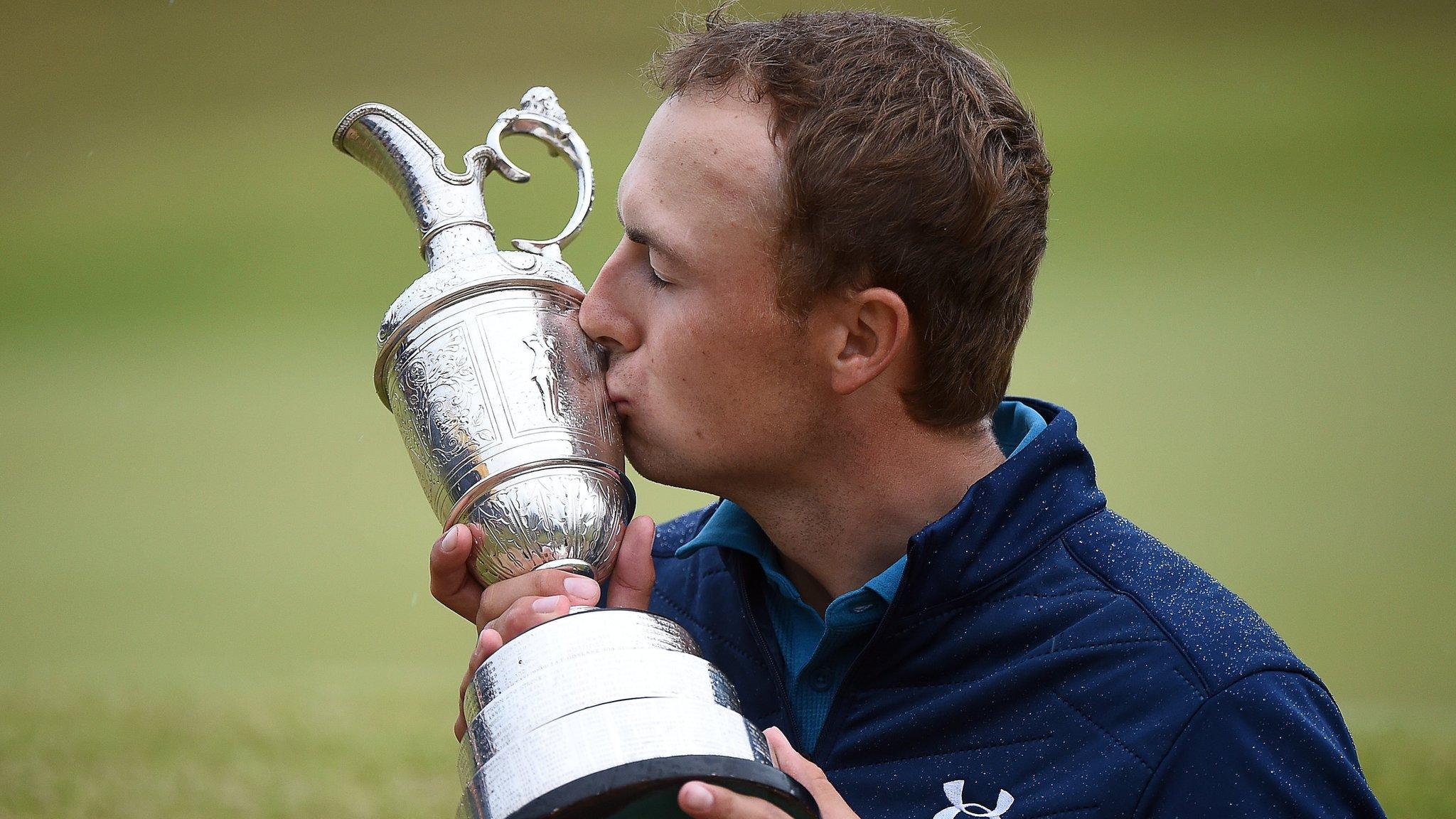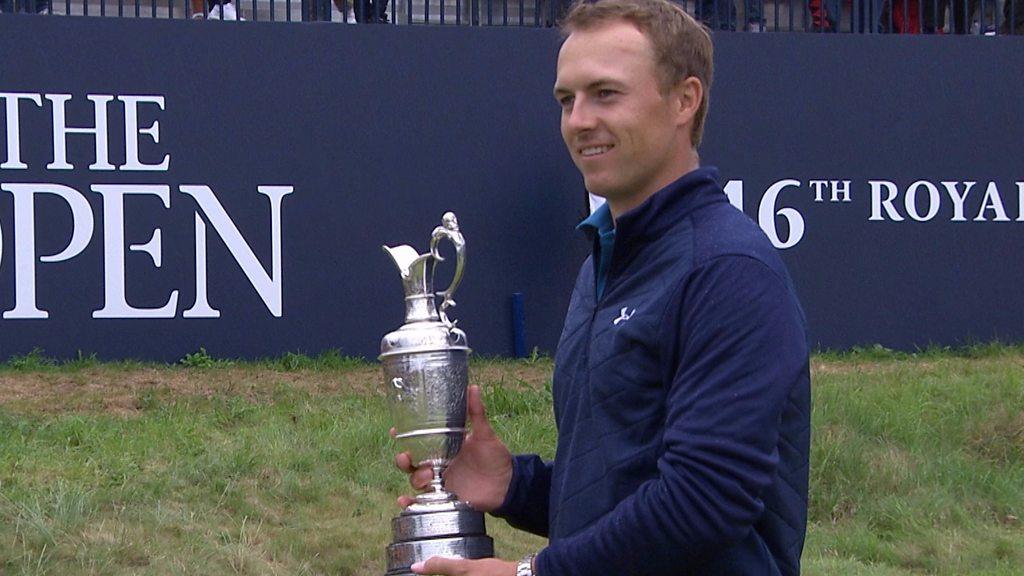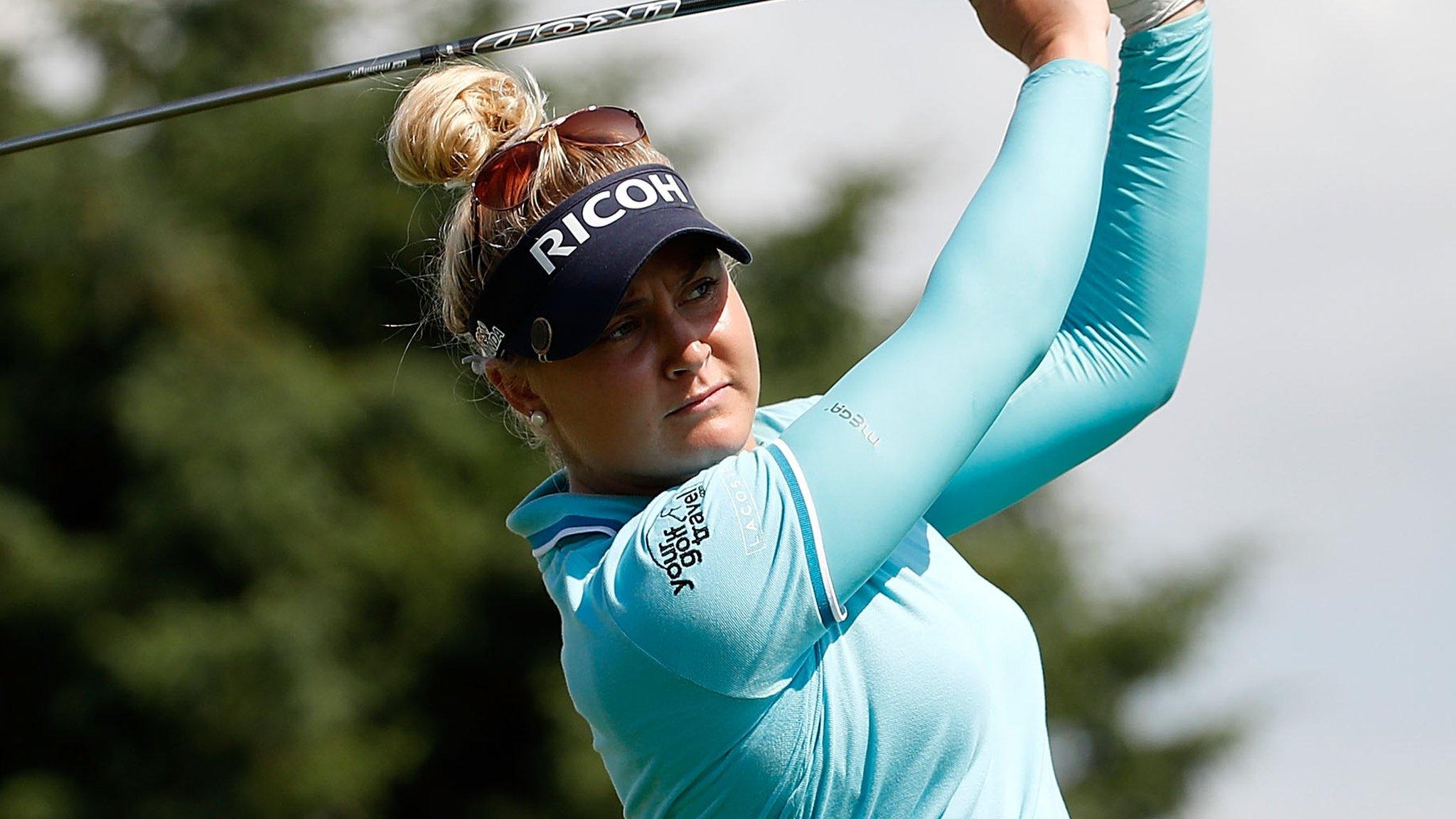The Open 2017: Jordan Spieth earns 'hardest, entirely anticipated win' at Royal Birkdale
- Published
- comments
Four holes which defined Spieth's Open win
So Jordan Spieth won The Open by three shots, just the same margin as he had held overnight, just as everyone assumed he would as Sunday afternoon began.
And in between came everything else possible and a lot that didn't seem to be and that those who saw up close could scarcely believe.
Spieth's fellow Texan and Masters champion Ben Crenshaw once spoke of looking into his young compatriot's eyes and seeing the dead-eyed stare of Wild West gunslinger Wyatt Earp. On the 13th hole of his final round, with the lead over Matt Kuchar gone up in smoke and his tee-shot lost in another postcode, Spieth simply looked dead.
Fifteen months ago he had led the Masters by five shots going to the par-three 12th before a quadruple-bogey seven detonated his hopes. Those sort of one-off collapses haunt a man. When those one-off collapses happen twice, you fear you might never escape.
And yet he did, first rescuing possibly the most valuable bogey he might ever make to hang on just one shot down, and then going on a charge that will live with him and this oldest of majors long into the years that come.
From the brink, a six-iron conjured off the 14th tee that clattered to four feet for a birdie to draw level with Kuchar once again. On the 15th, a 35-foot sweet monster of a putt for eagle and the lead. Sixteen, a near-replica for another birdie; on 17, a cold-blooded killer from seven feet for one more.
Birdie, eagle, birdie, birdie. Form from nowhere, a touch from the heavens. Kuchar had gone two under across the same four holes, and yet lost three shots on his playing partner.
That no-one saw it coming says a great deal about the respect the 23-year-old was already held in and significantly more about what pressure and the prospect of victory can do to even the most talented of sportsmen.
You saw no excuse for sudden collapses in the calm conditions over Southport nor the way the course was behaving. It appeared the peachiest of summer days out on the links, a soft breeze tickling the tops of the dunes, warm sun overhead and a smear of thin white cloud.
The squeeze on the scoring came instead from inside: the strain of a final day at The Open, the burden of leading for one and chasing for the rest.
Within moments of Spieth and Kuchar teeing off, tension had settled like a blanket over Birkdale, quietening the crowd, stifling the players. The chasing pack may have been dropping away, but the one out top was soon dropping back to meet them.
Having suffered only four bogeys across his first three rounds, Spieth found three in his first four holes.
His irons were cold, his putter frozen. A miss from six feet on the fourth, a drive into the spectators on the sixth, a missed four-footer for par after Kuchar's eight-foot birdie putt to leave it in the balance once more at eight under, with the back nine to come.
Kuchar, 16 years the older man, had only one top-10 finish from 12 previous Opens. The 23-year-old Spieth had two majors under his belt at an earlier age even than Tiger Woods.
Yet suddenly those big wet Kooch eyes were wide with possibilities. Spieth, dressed in indistinct colours - grey trousers, washed-out turquoise polo - was fading away, his characteristic control gone, face turning as pale as the clouds blowing in from the sea.
And then came the 13th, a hole that took half an hour to complete, a mini-epic that could have decided the championship one way but instead sent it other.
Jordan Spieth drinks from Claret Jug
There are sliced tee shots and there is what happened to Spieth's drive after Kuchar had found the middle of the fairway. With a left-to-right wind picking up, with his shoulders tightening, the Texan sent it so far right that it would have landed on an adjacent fairway, had there been an adjacent fairway.
Instead it cleared the long line of humpbacked dunes that lie beyond the thick border of rough and travelled on, so far that when the ball was initially found it turned out to be the wrong one, with the aid of the host broadcaster's GPS system required to locate the genuine item many yards further on.
In the past even Spieth has had trouble describing the best part of his own game, settling on the rather prosaic "playing badly well". Never has that been truer then when he found himself out by the practice ground, between two trailers, the green not just out of sight but the hordes of spectators between him and the flag hidden from view too.
One hundred and twenty-five yards sideways to the fairway. Play another off the tee? Take a penalty drop? Three-wood, as he held first, or three-iron?
Kuchar to 12 feet with his second. Spieth's caddie Michael Greller silhouetted on the top of the tallest dune trying to help him thread the needle with his eyes blindfolded.
Drop. Iron. Deep breath.
'Boy, what a tremendous five holes'
From out in those distant boondocks, Spieth cleared the dunes, the spectators, the rough. A chip on, a putt for the unlikeliest of bogey-fives. And then the charge, never looking back, never letting that momentum go.
"Today took as much out of me as any day that I've ever played golf," said a visibly shattered Spieth afterwards.
"Thoughts came in from my last scenario when I was leading a major on Sunday. All of a sudden it creeps into your head.
"I was so confident and all of a sudden, the wheels have come off everything, and it's how do you get back on track to salvage this round and just give yourself a chance at the end?
"And all of a sudden the lid came off, and the 30-footers were two-footers to me. I don't know why I can't make it a little more boring sometimes."
Kuchar looked like boring would have been just fine with him. "It's hard to explain," he said, still running the last cruel hour through his head.
"It's crushing. It hurts. And it's an excitement and a thrill to have played well, put up a battle, put up a fight."
Spieth is the youngest champion Open champion since Seve Ballesteros in 1979. He has joined Jack Nicklaus in winning three majors before the age of 24, and with the US PGA Championship round the corner could yet become the youngest to win a career Grand Slam in history.
That can wait for another day. First to relish this one, the Southport See-saw, the hardest entirely anticipated victory he will ever take.
Poulter, Fowler and Spieth shots of the final day
- Published23 July 2017

- Published23 July 2017

- Published20 July 2017
